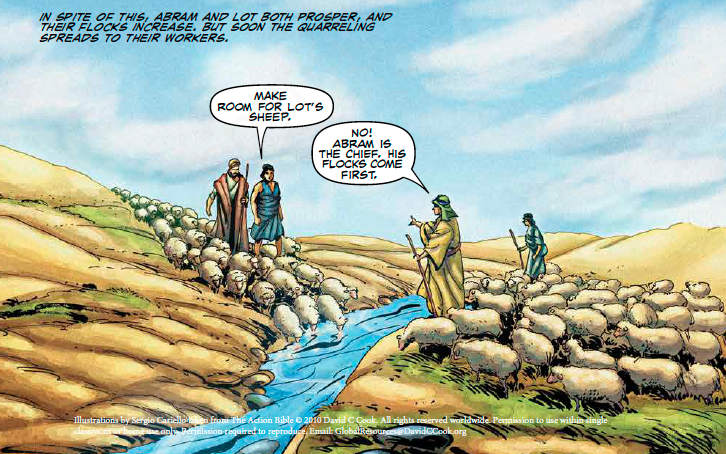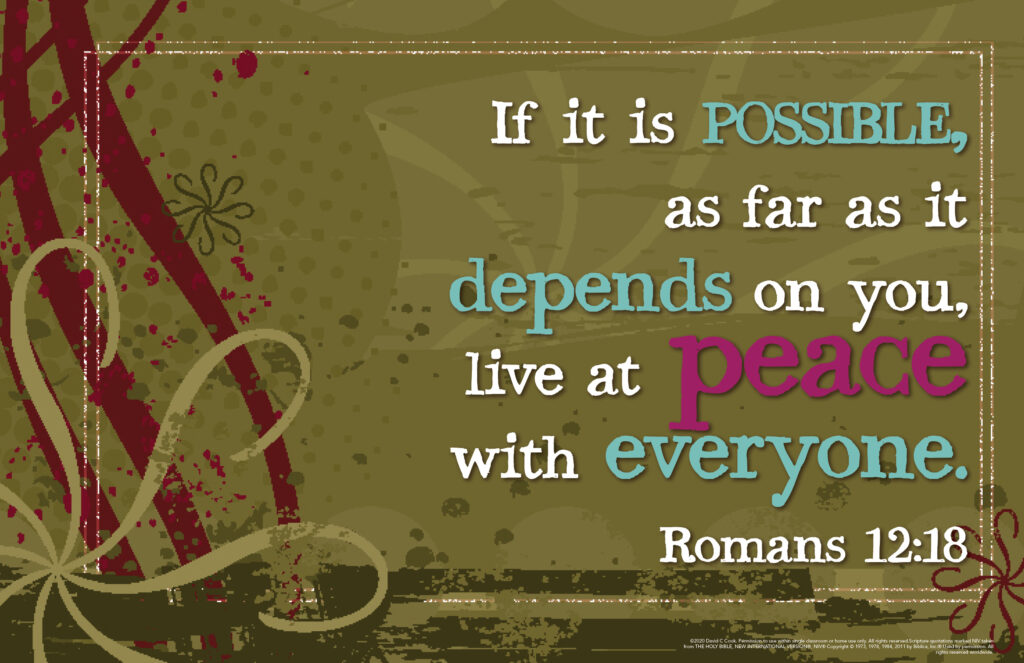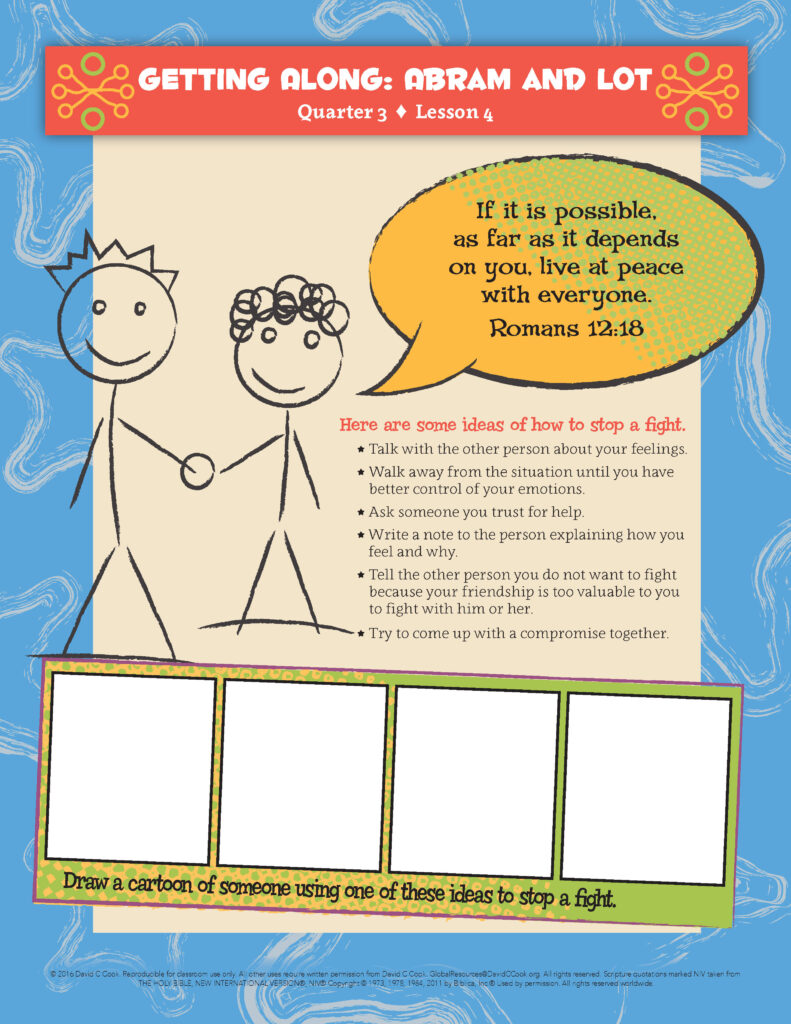During the lesson, the information for you to know is written in regular type, and what we suggest speaking or reading aloud to children is in bold. All resources for this lesson, including the Teacher Guide, Student Page, Family Connection Card, and other resources can be downloaded in a ZIP file by clicking on the following link:
In some lessons you will find "resource articles." These are articles written by experts from around the world to help equip you for your work with children and adolescents. Share them with parents or guardians if you consider it appropriate.
Now may the Lord of peace himself give you peace at all times and in every way. The Lord be with all of you.
2 Thessalonians 3:16
Jesus was born at a time when the government oppressed people. Armed soldiers were a common sight. Corrupt leaders lived richly while ordinary people lived in fear. God’s people expected a Messiah who would overcome the Roman government with a sword. They wanted a revolution or a military coup. Instead they got Jesus, who taught, “Blessed are the peacemakers” (Matthew 5:9).
How is your world similar to the world Jesus lived in? What would it look like for you to be a peacemaker in your world? As you prepare to teach about getting along, spend time praying about your role as a peacemaker in your relationships and community. Is there anger, confusion, or fear that you need to surrender to God? Are there active steps you can take to show God’s peace to those around you? As you lay down anything hindering you, ask Jesus to fill those places with His peace.
Let the families of your students know that they will be learning about getting along with others and hear the story of Abram and Lot in the Bible. Encourage family members to tell their child about an argument they had with someone and how they and the other person resolved it.
Teacher Tip: If possible, email or text the Family Connection Card to the families of your students.
Greet your children by name as they arrive. Have them talk about their answer to the following question with someone sitting near them:
Give the children 1–2 minutes to share with their partner. Then ask 2–3 children to share with the class. Remind them not to mention names.
Today we will learn a Bible story about 2 people who could have gotten into a big fight but did not. They figured out a way to live at peace with each other. First let’s learn a verse about living in peace with others. Listen to this wonderful Bible verse and we will learn actions to go with it:
If possible, read Romans 12:18 from your Bible.
If it is possible, as far as it depends on you, live at peace with everyone.
Romans 12:18
Have the children line up in 2 rows, facing each other. If you have an uneven number of children, line up with one so the lines are even. Teach the verse with these actions.
Have the children change partners several times as they say the verse with motion.
Let’s review what you remember about Abram.
Abraham, which means “father of many.”
God told Him to move. God was taking Abram and his family to the special land called Canaan.
Today’s Bible story takes place before God changed Abram’s name to Abraham. Abram had moved near the town of Bethel in the land of Canaan. His nephew Lot had moved with him. They both were very rich. They had lots of animals. They had servants to take care of the animals. But their servants often had big fights over whose animals should eat in the greenest fields.
Abram and Lot both had many sheep and other animals. They were all grazing in the same grassy area, but there was not enough space or water for them all. So Abram’s servants and Lot’s servants began to argue.
Show the Action Bible image of the shepherd arguing if possible.
Read Genesis 13:8–9 directly from your Bible.
So Abram said to Lot, “Let’s not have any quarreling between you and me, or between your herders and mine, for we are close relatives. Is not the whole land before you? Let’s part company. If you go to the left, I’ll go to the right; if you go to the right, I’ll go to the left.”
Genesis 13:8–9
Call on 1–2 children to share their explanations with the class. If needed, share this summary: Abram told Lot that they should avoid any fighting or arguing by going in opposite directions. They should each take their families, herdsmen, and animals to different places.
Lot looked out over the land and saw beautiful fields by the Jordan River. They were filled with green grass. So Lot chose this land. Abram agreed that Lot could have it.
Show the Action Bible image of Abram letting Lot choose which land he wanted.

Can you believe it? Abram gave away the best land. Lot was happy. The fight was over. But what will happen to Abram and his flocks now that Lot has the best land?
God was still taking care of Abram. He told Abram to look around—as far as he could see north and south, east and west. God told him that He would give all that land to Abram and his descendants.
The Bible does not tell us directly that Abram prayed to God before he talked to Lot about the problem. However, the Bible does say that Abram was a man of faith. Many times he listened to God and believed Him. Many times Abram obeyed God. He followed God’s way. Abram knew that fighting with Lot was not God’s way. Therefore, Abram was willing to give up the best land to Lot so that their argument would stop. He did not know that God had an even bigger and better land set aside for him.
Optional: If you are using The Action Bible, have the children review the story on pages 48-49.
If the children do not mention it, share that this happens because we are all sinners and live in a fallen world. We are often selfish.
I will read Romans 12:17–18 to you. When you hear Romans 12:18, which you learned earlier today, say it out loud with me.
Do not repay anyone evil for evil. Be careful to do what is right in the eyes of everyone. If it is possible, as far as it depends on you, live at peace with everyone.
Romans 12:17–18

Now I will read a verse that Jesus said:
Blessed are the peacemakers, for they will be called children of God.
Matthew 5:9
Because God is peace and wants us to have peace with Him and each other. When we work toward peace between people, we are following the example of our heavenly Father.
The Bible tells us that when others treat us badly, we should not treat them badly in return. Instead, when other people are evil, we should repay their evil with goodness. When other people are mean to us, we should be kind to them.
Because God wants us to have peace.
Divide children into groups of 2–3 for the next activity.
I will read a situation about being angry. In your group, talk about how I can follow Abram’s example. What can I do to keep my anger from ruining a very important friendship?
You can read the situations printed here or use situations that would be common in your community.
Situation 1: I am so angry with my friend. I just heard that she told someone a lie about me. I do not think I will ever forgive her.
Encourage the children to come up with ideas in their groups about how to keep your anger from ruining the friendship. For example, they might suggest talking to the friend and telling her how sad or hurt you are. They might suggest you write her a note to share your disappointment but that you still want to be friends. After about a minute, ask a couple of groups to share their ideas with the class. Praise the children for their creative ideas. Follow this pattern in the next situation.
Situation 2: He hit me. He just came up and hit me for no reason at all. I thought he was my friend. I will never trust him again.
Affirm the children for coming up with creative ways to follow Abram’s example and not let anger destroy friendships.
Being kind to people who are not kind to us is very hard to do! When you choose to follow Jesus and become a Christian, God gives you His Holy Spirit to help you. When you are starting to feel angry with someone, you can pray. God will help you!
If you are not a Christian, there are still steps you can take this week to get along with everyone.
I will give you some ideas of ways to stop a fight. Think about which one you think would work best for you in situations you face.
Give the children a few moments to pick which idea they will use, with God’s help, when they get angry or have an argument this week. Have them turn to their neighbor and share their choice with him. Tell the children that the next time you meet, you are going to ask them how the idea they chose worked.
Optional: If you are using Student Pages, allow the children time to draw a cartoon on the page of the idea they picked for stopping a fight.

Close class by praying this blessing, based on Matthew 5:9, over the children:
Blessing: Jesus said, “Blessed are the peacemakers.” May you look for a solution to every argument and fight. May you bring peace into every relationship and situation. And may you, like Abram, be blessed by God.
Lead the children in singing this quarter’s song if possible.
Life on Life ©2020 David C Cook. Reproducible for home or classroom use only. All other uses require written permission from David C Cook [email protected]. All rights reserved.